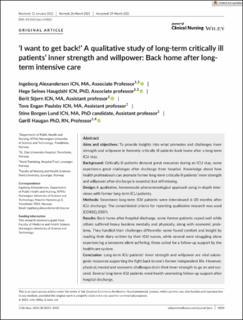| dc.contributor.author | Alexandersen, Ingeborg | |
| dc.contributor.author | Haugdahl, Hege Selnes | |
| dc.contributor.author | Stjern, Berit | |
| dc.contributor.author | Paulsby, Tove Engan | |
| dc.contributor.author | Lund, Stine Borgen | |
| dc.contributor.author | Haugan, Gørill | |
| dc.date.accessioned | 2023-05-26T05:57:27Z | |
| dc.date.available | 2023-05-26T05:57:27Z | |
| dc.date.created | 2021-03-29T10:48:21Z | |
| dc.date.issued | 2021 | |
| dc.identifier.citation | Journal of Clinical Nursing (JCN). 2021, 30 (23-24), 3023-3035. | en_US |
| dc.identifier.issn | 0962-1067 | |
| dc.identifier.uri | https://hdl.handle.net/11250/3069064 | |
| dc.description.abstract | Aims and objectives
To provide insights into what promotes and challenges inner strength and willpower in formerly critically ill patients back home after a long-term ICU stay.
Background
Critically ill patients demand great resources during an ICU stay, some experience great challenges after discharge from hospital. Knowledge about how health professionals can promote former long-term critically ill patients’ inner strength and willpower after discharge is essential, but still missing.
Design
A qualitative, hermeneutic-phenomenological approach using in-depth interviews with former long-term ICU patients.
Methods
Seventeen long-term ICU patients were interviewed 6–20 months after ICU discharge. The consolidated criteria for reporting qualitative research was used (COREQ,2007).
Results
Back home after hospital discharge, some former patients coped well while others suffered heavy burdens mentally and physically, along with economic problems. They handled their challenges differently: some found comfort and insight by reading their diary written by their ICU nurses, while several were struggling alone experiencing a lonesome silent suffering; these called for a follow-up support by the healthcare system.
Conclusion
Long-term ICU patients’ inner strength and willpower are vital salutogenic resources supporting the fight back to one’s former independent life. However, physical, mental and economic challenges drain their inner strength to go on and succeed. Several long-term ICU patients need health-promoting follow-up support after hospital discharge.
Relevance to clinical practice
This study disclosed a lonely and silent suffering indicating a need for development of systematical health-promoting follow-up programmes including salutogenic components such as health-promoting conversations, diaries and web-based recovery programme along with a cell phone app. | en_US |
| dc.language.iso | eng | en_US |
| dc.publisher | Wiley | en_US |
| dc.rights | Navngivelse-Ikkekommersiell 4.0 Internasjonal | * |
| dc.rights.uri | http://creativecommons.org/licenses/by-nc/4.0/deed.no | * |
| dc.title | ‘I want to get back!’ A qualitative study of long-term critically ill patients’ inner strength and willpower: Back home after long-term intensive care | en_US |
| dc.title.alternative | ‘I want to get back!’ A qualitative study of long-term critically ill patients’ inner strength and willpower: Back home after long-term intensive care | en_US |
| dc.type | Peer reviewed | en_US |
| dc.type | Journal article | en_US |
| dc.description.version | publishedVersion | en_US |
| dc.source.pagenumber | 3023-3035 | en_US |
| dc.source.volume | 30 | en_US |
| dc.source.journal | Journal of Clinical Nursing (JCN) | en_US |
| dc.source.issue | 23-24 | en_US |
| dc.identifier.doi | 10.1111/jocn.15812 | |
| dc.identifier.cristin | 1901578 | |
| cristin.ispublished | true | |
| cristin.fulltext | original | |
| cristin.qualitycode | 2 | |

